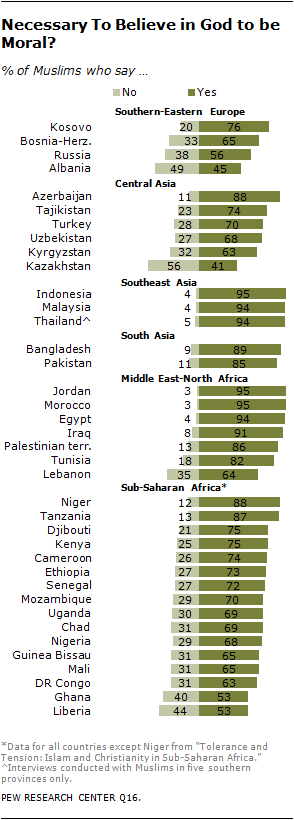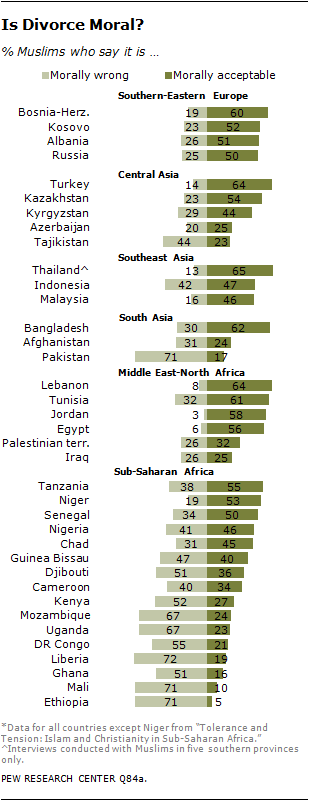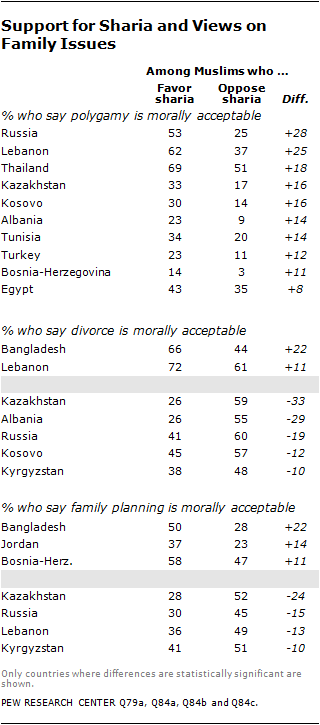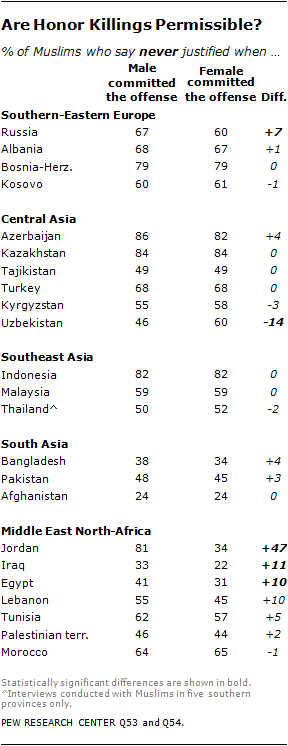
Most Muslims agree on certain moral principles. For example, in nearly all countries surveyed, a majority says it is necessary to believe in God to be a moral person. There also is widespread agreement that some behaviors – including drinking alcohol, sex outside marriage, homosexuality and committing suicide – are immoral.

There is less agreement, however, when it comes to other moral questions related to marriage and family life. For example, the percentage of Muslims who say that divorce is morally acceptable varies widely among countries. Similarly, Muslims are divided about the acceptability of polygamy and the morality of family planning.
God and Morality
Muslims widely hold the view that it is necessary to believe in God to be moral and have good values. In nearly every country surveyed, at least half of Muslims say an individual’s morality is linked to belief in God. This is true especially in the countries surveyed in Southeast Asia, where more than nine-in-ten Muslims say it is necessary to believe in God to be a moral person. At least eight-in-ten say the same in most countries surveyed in South Asia and the Middle East-North Africa region; only in Lebanon does a smaller majority (64%) share this view.
At least half of Muslims in all the countries surveyed in sub-Saharan Africa accept that personal morality is based on belief in God. This view is most widely held in Niger (88%) and Tanzania (87%), followed by Djibouti and Kenya (75% each).
Most Muslims in Central Asia as well as Southern and Eastern Europe also agree that belief in God is necessary to be moral, including 88% in Azerbaijan and 76% in Kosovo. Only in Albania (45%) and Kazakhstan (41%) do fewer than half share this opinion.
In many countries, Muslims who pray several times a day are more likely than those who pray less often to say it is necessary to believe in God to be moral. The differences are particularly large in Russia (+40 percentage points), Lebanon (+39), Kosovo (+23) and Bosnia-Herzegovina (+22). On this question, there are no consistent differences by age or gender across the countries surveyed.
Beliefs About Morality
The survey asked Muslims around the world if they considered a range of behaviors to be morally wrong, morally acceptable or not a moral issue. Respondents also could volunteer that “it depends on the situation” or that they don’t know. The survey finds that most Muslims agree that certain behaviors – such as drinking alcohol, suicide and sex outside marriage – are morally wrong. However, significant minorities of Muslims in some countries consider such behaviors morally acceptable or say they are not a moral issue.
Drinking alcohol
Most Muslims surveyed say that drinking alcohol is morally wrong.21 More than half in all countries surveyed hold this view, including more than nine-in-ten in Thailand (98%), Ghana (93%), Malaysia (93%), the Palestinian territories (92%), Indonesia (91%), Niger (91%) and Pakistan (91%).
However, in 11 of the 37 countries where this question was asked, at least one-in-ten say that drinking alcohol is morally acceptable, including in Chad (23%), Mozambique (20%), the Democratic Republic of the Congo (17%) and Bosnia-Herzegovina (16%).

In addition, in some countries sizable percentages say consuming alcohol is not a moral issue. These include Afghanistan (23%) and Chad (20%), as well as the former communist states of Albania (34%), Bosnia-Herzegovina (21%) and Azerbaijan (20%).
Suicide and Euthanasia
Majorities of Muslims in all countries believe that suicide is morally wrong, including three-quarters or more in 29 of the 37 countries where this question was asked.22 This view is almost universal in Thailand (nearly 100%), Cameroon (98%) and Kenya (97%).
In only four of the countries where this question was asked do as many as one-in-ten Muslims say suicide is morally acceptable. All four countries are in sub-Saharan Africa: Guinea Bissau (13%), the Democratic Republic of the Congo (11%), Mozambique (10%) and Uganda (10%).

In 13 countries, at least one-in-ten Muslims do not consider suicide to be a moral issue. A third or more take this view in Jordan (40%), Azerbaijan (34%) and Egypt (33%).
As with suicide, most Muslims believe that euthanasia – defined in the survey as ending the life of an incurably ill person – is morally wrong. A majority of Muslims in 33 of the 37 countries surveyed hold this view, including more than three-quarters in 17 countries.
The sub-Saharan African countries of the Democratic Republic of the Congo (14%), Uganda (14%), Mozambique (13%) and Guinea Bissau (12%) are the only nations surveyed where more than one-in-ten Muslims say euthanasia is morally acceptable.
Substantial minorities, however, do not define euthanasia as a moral issue. In 16 of the 37 countries, at least one-in-ten Muslims say it is not a moral issue, including 46% in Jordan, 41% in Azerbaijan and 38% in Egypt. Additionally, in six countries, one-in-ten or more volunteer that the moral status of euthanasia depends on the context in which it occurs: Kazakhstan (14%), Egypt (11%), Albania (10%), the Democratic Republic of the Congo (10%), Kyrgyzstan (10%) and Russia (10%).
Abortion
Most Muslims say that having an abortion is morally wrong, including three-quarters or more in 24 of the 37 countries where the question was asked.23 Azerbaijan is the only country where fewer than a quarter (23%) say terminating a pregnancy is immoral.
By contrast, few Muslims say that abortion is morally acceptable. In only five countries do one-in-ten or more say the practice is morally permissible: Bangladesh (18%), Uganda (15%), Bosnia-Herzegovina (14%), Mozambique (13%) and the Democratic Republic of the Congo (10%).

In 13 countries however, at least one-in-ten Muslims say abortion is not a moral issue. This view is especially common in some countries in the Middle East-North Africa region; 34% in Jordan, 22% in Egypt and 21% in Iraq say they do not consider abortion to be a moral question.
Additionally, in 11 of the countries surveyed, at least one-in-ten Muslims volunteer that the morality of having an abortion depends on the situation. Half of Azerbaijani Muslims and more than a third (34%) of Muslims in Tajikistan take this view. Overall, this perception is most common in Central Asia and the Middle East-North Africa region.
Sex Outside Marriage and Prostitution
A strong majority of Muslims in nearly all countries surveyed condemn pre- and extra-marital sex, including three-quarters or more in 29 of the 36 countries where the question was asked. This view is nearly universal in Thailand (99%), Jordan (96%), Lebanon (96%) and Egypt (95%).24

Muslims in Southern and Eastern Europe as well as sub-Saharan Africa are somewhat more tolerant of sex outside marriage. At least one quarter in Bosnia-Herzegovina (26%) and Albania (25%) say sex outside marriage is morally acceptable. And in sub-Saharan Africa, nearly two-in-ten share this view in Guinea Bissau (19%), Chad (18%) and Uganda (18%).
Few Muslims believe sex outside marriage is not a moral issue. In only six of the countries surveyed does more than one-in-ten take this position: Cameroon (17%), Bosnia-Herzegovina (16%), Ethiopia (16%), Chad (15%), Bangladesh (13%) and Djibouti (12%).
Muslims are even more emphatic that prostitution is morally wrong. More than seven-in-ten in each country surveyed say it is immoral. Only in Chad (10%) do as many as one-in-ten Muslims say prostitution is morally acceptable. Meanwhile, in a few countries, small percentages of Muslims say prostitution is not a moral issue: Bangladesh (12%), Chad (12%), Djibouti (10%) and Guinea Bissau (10%).
Homosexuality
Muslims overwhelmingly say that homosexual behavior is morally wrong, including three-quarters or more in 33 of the 36 countries where the question was asked.25

Only in three countries do as many as one-in-ten Muslims say that homosexuality is morally acceptable: Uganda (12%), Mozambique (11%) and Bangladesh (10%).
In most countries surveyed, fewer than one-in-ten Muslims believe homosexual behavior is not a moral issue. The exceptions are Bangladesh (14%), Guinea Bissau (14%) and Bosnia-Herzegovina (10%).
Morality and Marriage
Although Muslims strongly agree on the morality of a range of behaviors, Muslims hold a range of opinions on the morality of divorce, family planning and polygamy.
Divorce
In 15 of the 37 countries where the question was asked, at least half of Muslims consider divorce a morally acceptable practice.26 Acceptance is high in Thailand (65%), Turkey (64%), Lebanon (64%), Bangladesh (62%), Tunisia (61%) and Bosnia-Herzegovina (60%).
By contrast, at least half of Muslims in 10 countries believe divorce is morally wrong. This includes roughly seven-in-ten Muslims in Liberia (72%), Mali (71%), Ethiopia (71%) and Pakistan (71%).

In the majority of countries surveyed, at least one-in-five Muslims say divorce is not a moral issue or that it depends on the situation. These views are particularly widespread in Azerbaijan (50%), Iraq (48%) and Afghanistan (44%).
There is no consistent pattern of differences on this question by age or gender across the countries surveyed. However, younger Muslims are more likely to say that divorce is morally acceptable in Albania (+14 percentage points) and Kosovo (+12). And men are somewhat more likely than women to say that divorce is morally acceptable in Pakistan (+13) and Egypt (+10).
Polygamy
Muslims in the countries surveyed are divided on the moral status of polygamy.27 At least half view polygamy as morally acceptable in 11 of the 37 countries where the question was asked. Acceptance is most widespread in sub-Saharan Africa; at least six-in-ten in Niger (87%), Senegal (86%), Mali (74%), Cameroon (67%), Tanzania (63%) and Nigeria (63%) describe polygamy as morally acceptable. Outside of sub-Saharan Africa, however, the only country where a majority of Muslims say polygamy is morally acceptable is Thailand (66%).

At the opposite end of the spectrum, at least half of Muslims in 12 countries say polygamy is immoral. Muslims in Central Asia as well as Southern and Eastern Europe are the most likely to say that polygamy is morally wrong, with six-in-ten or more taking this position in all the countries surveyed in the regions except Kyrgyzstan (53%), Russia (49%) and Tajikistan (47%). Outside these two regions, Tunisia (67%) is the only country where more than six-in-ten reject polygamy.
Compared with divorce, fewer Muslims believe polygamy is not a moral issue or that it depends on the situation. Still, in 14 of 37 countries at least one-in-five say it is not a moral issue or it depends on the circumstances. These views are especially widespread in Jordan (52%), Egypt (51%), Afghanistan (44%), Malaysia (39%) and Tajikistan (38%).
In most countries men are more likely than women to say that polygamy is morally acceptable. The gap is largest in Pakistan (+29 percentage points), followed by Iraq (+21), Thailand (+21), Lebanon (+20), Russia (+19) and the Palestinian territories (+18). There are no consistent differences between the beliefs of younger and older Muslims about the moral status of polygamy.
Family Planning
There is no clear agreement among Muslims in the survey about the morality of family planning.28 In just three of the 21 countries where the question was asked do at least half of Muslims say that it is morally acceptable for married couples to choose to limit the number of children they have. Roughly six-in-ten say this in Indonesia (61%) and Tajikistan (58%). About half say family planning is morally acceptable in Tunisia (51%).

Yet in two countries where this question was asked roughly half of Muslims say family planning is morally wrong – Thailand (50%) and Pakistan (47%). A substantial minority in Tunisia (40%) also shares this view.
In 17 countries, at least one-in-five Muslims say family planning is not a moral issue or say it depends on the situation. These beliefs are particularly common in the Middle East and North Africa. In every country surveyed in the region except Tunisia (8%), more than a third of Muslims say family planning is not a moral issue or it depends, including 56% in Jordan, 49% in Egypt and 47% in Iraq.
There are no consistent differences between older and younger Muslims or men and women in their beliefs about the moral status of family planning.
Sharia, Morality and the Family

The survey finds that Muslims who want sharia to be the official law of the land in their country often have different views from other Muslims about the morality of issues related to marriage and the family. Across countries, however, Muslims who want sharia to be official law do not always take consistent positions on whether divorce and family planning are acceptable practices.
Polygamy
In many of the countries surveyed, beliefs about the moral status of polygamy are strongly linked to support for sharia as the official law of the land. Muslims who favor Islamic law as the official law in their country are consistently more likely to say polygamy is an acceptable practice than are those who do not want sharia as official law. The differences are relatively larger in Russia (+28 percentage points) and Lebanon (+25).
Divorce
On the question of whether divorce is morally acceptable, support for sharia does not have a uniform effect in all countries. In some countries, those who support Islamic law as the official law in their country are more likely to say that divorce is morally acceptable. This trend is most pronounced in Bangladesh (+22 percentage points) and Lebanon (+11). Meanwhile, in other countries, especially former communist countries in Southern and Eastern Europe, the opposite is true: Those who support sharia as the law of the land are less likely to say divorce is morally acceptable. The largest differences are in Kazakhstan (-33), Albania (-29) and Russia (-19).
Family Planning
In some countries, support for sharia is linked to attitudes on the moral status of family planning. But, as in the case of divorce, how the two are linked differs across countries. In some countries, those who favor sharia as the law of the land are less likely to say family planning is morally acceptable, including in Kazakhstan (-24 percentage points), Russia (-15) and Lebanon (-13). However, those who favor the implementation of sharia as the official law are more likely to say that family planning is a moral practice in Bangladesh (+22), Jordan (+14) and Bosnia-Herzegovina (+11).
Beliefs About Family Honor

The survey asked Muslims whether honor killings are ever justified as punishment for pre- or extra-marital sex.29 In 14 of the 23 countries where the question was asked, at least half say honor killings are never justified when a woman stands accused. Similarly, at least half in 15 of 23 countries say honor killings of accused men are never justified. In only two countries – Afghanistan (60%) and Iraq (60%) – do majorities say honor killings of women are often or sometimes justified, while only in Afghanistan does a majority (59%) say the same about executing men who have allegedly engaged in pre- or extra-marital sex.
In all countries surveyed in Southern and Eastern Europe, Central Asia and Southeast Asia, roughly half or more of Muslims say honor killings of women who have been accused of pre- or extra-marital sex are never justified, including at least eight-in-ten who hold this view in Kazakhstan (84%), Azerbaijan (82%) and Indonesia (82%). With the exception of Uzbekistan, attitudes toward the execution of accused men are nearly identical to opinions about accused women in these countries.
Muslims in South Asia are less likely to say honor killings of both women and men are never justified. In Pakistan, 45% of Muslims say executing accused women is never justified, and 48% say the same about accused men. In Bangladesh, fewer than four-in-ten Muslims reject honor killings for women (34%) and men (38%), while in Afghanistan roughly a quarter say executing a woman (24%) or a man (24%) is never justified.
In four of the seven countries where the question was asked in the Middle East-North Africa region, at least half of Muslims say honor killings of accused men are never justified: Jordan (81%), Morocco (64%), Tunisia (62%) and Lebanon (55%). Smaller percentages share this view in the Palestinian territories (46%), Egypt (41%) and Iraq (33%). But in only two countries in the region – Morocco (65%) and Tunisia (57%) – does a majority reject honor killings of accused women. In the other countries surveyed in the region, the percentage of Muslims who reject honor killings of women ranges from 45% in Lebanon to 22% in Iraq.

In three countries surveyed in the Middle East and North Africa, Muslims are significantly more likely to reject honor killings of men than women: Jordan (+47 percentage points), Iraq (+11) and Egypt (+10).
Across the countries surveyed, attitudes toward honor killings of women and men are not consistently linked to religious observance. In most countries, Muslims who pray several times a day are just as likely as those who pray less often to say that honor killings are never justified. There also are no consistent differences by age or gender. However, in some countries surveyed, Muslims who support sharia are less likely to say that honor killings of women and men are never justified. Large gaps are found in Albania, Tunisia, Tajikistan and Lebanon, among other countries.
Footnotes:
21 Alcohol and other intoxicants are forbidden in the Quran (5:90-1). (return to text)
22 Killing oneself is condemned in numerous hadith, including Sahih al-Bukhari 71:670 and 73:73. (return to text)
23 A hadith in Sahih al-Bukhari (54:430) says that a fetus has a soul within 120 days of gestation. (return to text)
24 Sex outside of marriage is forbidden by the Quran (17:32; 24:2-5). A hadith in Sahih al-Bukhari (34:439) forbids prostitution. (return to text)
25 Certain verses of the Quran indicate that homosexuality is forbidden (Quran 26:165-66 and 7:80-4). (return to text)
26 Surat (chapter) 65 of the Quran specifies certain conditions under which divorce is permissible. (return to text)
27 Polygamy is generally considered an accepted practice in all main schools of Islam. The Quran permits men to take up to four wives as long as they can treat all equitably and with justice. See Quran 4:3. (return to text)
28 According to John Esposito, “The Quran contains no clear or explicit text regarding birth control. However, the traditions (hadith) of Muhammad do. Though some traditions forbid birth control the majority permit it.” See Esposito, John L. 2003. “Birth Control/Contraception.” In The Oxford Dictionary of Islam. Oxford University Press, page 44. (return to text)
29 The Quran and hadith do not condone honor killings, that is, taking the life of a family member who has allegedly brought shame on his or her family. See Gill, Aisha. 2011. “Reconfiguring ‘Honour’-Based Violence as a Form of Gendered Violence.” In Idriss, Mohammad Mazher and Tahir Abbas, editors. Honour, Violence, Women and Islam. Routledge, pages 222-223. (return to text)
Photo Credit: © Scott E Barbour


